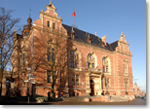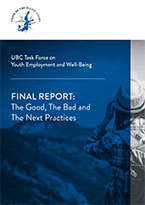Secretariat
Wały Jagiellońskie 1
80-853 Gdańsk Poland
tel. +48 58 301 09 17
tel. +48 58 301 91 23
fax +48 58 301 76 37
 Contact us
Contact us


Conference statements
Co-operation in the Baltic Sea Region
Dear Baltic Sea Friends,
CBSS is paying increasing attention to de-centralised co-operation. This has been manifested in CBSS resolutions as well as giving UBC and BSSSC the status as Special Participant. On behalf of UBC I would like to start with expressing my satisfaction with the increased attention given to the development of it. I think the co-operation soon will be more concrete. Our working groups and commissions could have permanent contacts and our secretariats exchange continuos information.
I think it is time to be concrete and to find out what really is needed to do. I have mentioned several times before that there are many concrete projects where co-operation between levels is beneficial, such as shaping a special EU program for local and regional co-operation, implementation of Agenda 21, preparing for EU enlargement, and so on.
Today I would like to concentrate on two important fields, first a proposal on an EU Program for co-operation between local and regional authorities, and secondly a few words on Local Authority Contribution to the Nordic Dimension.
1. Creation of a Baltic Sea Program
Since November last year, there has practically not been any EU financed program for co- operation between local and regional authorities. If we are lucky, a call for projects from the new program Interreg III will come earliest next year, and new projects can start perhaps a year after the call.
It seems that the future programmes, like Interreg III, will be similar to Interreg IIA, which, in my opinion, could have met the needs of our region better. There are many good Interreg IIA projects, but there are also many much needed projects which could not get funding from Interreg IIA because the rules were not sufficiently based on the conditions here. Also the BSPF and other programs for local and regional co-operation had their drawbacks. The main problems with BSPF were associated with the distant decision making in Brussels.
This arises the challenge of shaping a program for local and regional co-operation based on the perquisites here, managed here and where the decisions regarding projects shall be taken by local decision makers here in the Baltic Sea Region. I know that also BSSSC is supporting this idea.
In order to accomplish this, we must formulate needs and collect project ideas, as well as mobilising the Baltic Sea Organisations in a joint strategy in Brussels and to mobilise all our possible friends in the EU system, for example in the EU parliament.
UBC is at present shaping a working group to formulate needs and compile project ideas to create a program, financed through the Interreg III. I would like to invite both CBSS and BSSSC to take part in the work of this group.
We need to start planning how to carry out the lobbying and political work on accomplishing the task and to find financing. I suggest that a special working group will be formed also for this purpose.
I have noticed the Danish proposal to allocate funding for decentralised co-operation and the proposal that all Nordic countries should do the same. I very much support the idea as a complement to an EU-financed program. There is a great need for such funding. Compared to a year ago, I have noticed that there is less money available for local authorities in the Baltic States and Poland as a consequence of the macro-economic problems in 1999. We have now the situation that many local authorities have to choose between paying salaries or taking part in projects.
2. Local and Regional Level Contribution to the Nordic Dimension
We have to co-operate on a political level in order to make the voice of our region heard in Brussels. We are rather new to the European Union, and we need to be heard.
A very good starting point is the Nordic Dimension. It must be filled with political content also from the local authority point of view.
The UBC Board has had the opportunity to read the conclusions from the BSSSC Working Group on the Nordic Dimension, which we find very valuable and inspiring. UBC is also presently taking initiatives regarding the relevance of the Northern Dimension to Local Authorities. Mr Armas Lahoniitty, vice-president of UBC, has commissioned the University of Turku to investigate this matter. I do not want to anticipate the results but I still would like to comment on the issue a little.
The Nordic Dimension is an officially adapted EU Policy, even if it is vague and has few, if any, concrete implementations yet. It can be characterised as a contribution or additive to the EU policy, following the new situation of the European Union when Sweden and Finland became EU members. So, what is new in the European Union from local and regional authority perspective after the accession of Sweden and Finland? I would like to emphasise three points:
The first is that the roots of EU tradition and political concepts rest heavily in the European Inland, even if Europe has by far the longest coastline of any continent, compared to size. We must adjust that perspective, especially in the light of the Baltic Sea becoming almost an Inland Sea in the European Union, but also in the light of that Sweden, Finland and Denmark together constitute 25 % of the area of the European Union.
This gives for example new perspectives to the European Transborder Co-operation concepts, which also have their roots from conditions along the internal European borders in the early seventies. Of course the rules and regulations have been developed since that time in order to adapt to new situations, but in essence the presence of this historic heritage is very strongly felt. You can notice it in cross-border co-operation projects between unequal partners and cross-border co-operation with Russia, but above all cross-border co-operation over maritime frontiers is difficult to carry out with EU support. If the roots of European Trans-border Co-operation concepts had been here in the BSR, they certainly would look quite different.
One result of this is the coming Interreg III. Cross-border co-operation across maritime frontier is difficult across the Baltic Sea in the so-called Strand A, which has 50-80 % of the money available for Interreg III.
The second point is that we are bringing a concept of strong and independent local authorities into the European Union. The terms "Local Authorities" give different associations depending on whom you are talking to. I have heard that in France there exists local authorities with no inhabitants at all - and all local authorities are all very dependent of Paris. Perhaps a local and regional level contribution to the Nordic Dimension could be the concept of strong and independent local and regional authorities, and of course also their strong associations, isn't it real subsidiarity?
The third point is perhaps our tradition of working in big networks and organisations - this meeting is a proof of that. The European Union has not fully adapted to this - the political concepts as well as regulations and rules in programs do not comply with the situation here in this respect. Also this point could perhaps be a part of the local and regional authority impact on the Northern Dimension.
Final remark: Russia, the Barents Sea Co-operation and Belarus
In 1999, the number of Russian UBC member cities have increased from 3 to 7. Kaliningrad has always been active in UBC, and now also St Petersburg is upgrading their activities. Several of our new member cities come from the St Petersburg area. We are open for more new members from Russia.
We welcome also the co-operation with the Barents Sea area. We have invited representatives from the Barents Sea Co-operation to our next Board Meeting in March, which will be located to our northernmost member city, Kemi in Finland, where we will discuss concrete co-operation issues.
We also have a discussion within UBC on Belarus - we have recieved an application on membership of some Belarus cities. One problem is of course that we have not got the applications directly from the cties, but from the Belarus government in Minsk. We are at present discussiong what to do. Perhaps we are, under special conditions, ready to accept these cities in our co-operation.
Thank you!
Anders Engström, UBC President
at the CBSS meeting Oslo December 15th 1999




